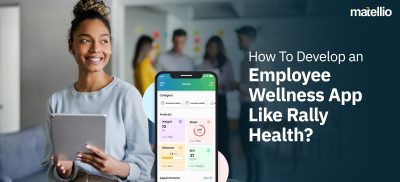
Apartment management can be difficult and time-consuming, requiring extensive teamwork. Numerous facets of apartment management must be managed properly and efficiently, from dealing with maintenance requests to handling finances, managing lease agreements, and connecting with residents.
Thankfully, there is a solution to this problem in the digital transformation era: apartment management app. By utilizing digital transformation services, apartment managers may improve communication and coordination amongst diverse stakeholders, improve operations, and lessen the workload.
This blog will offer insightful information and helpful tips for success, whether you’re a business owner attempting to develop an apartment management app or an apartment manager wishing to deploy one.
So, let’s get started!
What is an Apartment Management App?
An apartment management app is a digital tool or app designed to help landlords, property managers, and building owners manage and streamline their rental properties. These apps allow users to perform various tasks, such as tenant screening, rent collection, maintenance requests, lease management, and communication with tenants.
With an apartment management app, landlords can efficiently run their property from a single platform, saving time and improving the overall tenant experience.
What are the Benefits of Developing an Apartment Management App?

Following are Some key benefits of apartment management app development:
Streamlined Communication
An apartment management app can offer features such as instant messaging, push notifications, and email alerts that allow property managers to communicate more efficiently with tenants. This can include sending out important announcements, updates on maintenance requests, and reminders for rent payments.
Tenants can also use the app to report issues or make requests, which property managers can address quickly. By centralizing communication through the app, managers can avoid missing important messages or phone calls, saving time and improving overall communication.
Additionally, the app can offer features such as online rent payment, lease signing, and document storage, further streamlining communication and simplifying the rental process for tenants and property managers.
Simplified Rent Payment
An apartment management app can simplify rent payments by allowing tenants to pay their rent online via the app. This eliminates the need for tenants to visit the apartment complex office to pay their rent physically. It saves time and effort for both the tenants and the property management team.
The app can also send automatic reminders to tenants before the rent is due, ensuring timely payments. Additionally, the app can provide a digital receipt of the rent payment, which can be easily accessed by both the tenant and the property management team for record-keeping purposes. An apartment management app can make rent payments more convenient, efficient, and organized for all parties involved.
Maintenance Requests
Tenants can easily submit maintenance requests through the app, and property managers can track and manage these requests efficiently. This ensures that issues are resolved quickly, and tenants are satisfied with the property.
Improved Security
The app provides a layer of security for tenants by allowing them to report suspicious activity or safety hazards. Apartment management apps can improve security by providing real-time access control, digital key management, video surveillance, emergency notifications, and communication and reporting capabilities. These features can help prevent security breaches and keep residents and staff safe. This ensures that the property is safe and secure for everyone.
Enhanced Organization
Property managers can use the app to track lease agreements, tenant information, and other essential documents. This helps to streamline administrative tasks and ensure that everything is well-organized and up to date.
Time Saving
Property managers and tenants can save time and avoid unnecessary paperwork with everything in one place. An apartment management app can save time by simplifying communication, automating tasks, improving record-keeping, and providing residents with 24/7 access to critical information. This allows them to focus on other important tasks and enjoy a more efficient, streamlined experience.
As you’ve seen the top benefits; now let’s move forward and discuss,
Read More: How to Develop a Real Estate App Like Redfin?
Critical Features of the Apartment Management App!
To make your application stand out, you need to include unique functionality. Below we’ve listed some key features that you consider including in your custom apartment management app:
- Maintenance Requests – Property management apps allow tenants to request maintenance services or report issues directly from their mobile devices. The app automatically forwards the request to the property manager, who can assign the job to a maintenance team member. Apartment management apps allow tenants to easily submit maintenance requests, track the status of their requests, and receive updates on when repairs will be completed. These apps can help streamline the process of submitting and managing maintenance requests for tenants and apartment managers.
- Online Rent Payments – Tenants can pay their rent online through the app, making it more convenient for them and the property manager. The online rent payment feature in an apartment management app allows tenants to conveniently and securely pay their rent online through the app. This eliminates the need for paper checks and provides tenants with a quick and easy payment method. It also simplifies the rent collection process for property managers and reduces the risk of lost or stolen payments. The online payment feature can be integrated with various payment modes, such as credit/debit cards, and NACH transfers, allowing tenants to choose their preferred payment option. The app can also provide automated reminders and notifications to tenants for upcoming rent payments, helping to ensure on-time payments and avoid late fees.
- Integration – The app should integrate with other property management tools, such as accounting app, maintenance tracking app, and property listing sites. This will make it easier for landlords to manage their properties from a single platform.
- Lease Management – Apartment management apps store all lease agreements and important documents in one place. Property managers can use the app to track lease expiration dates and send renewal notices to tenants. An apartment management app that includes lease management features can streamline communication and reduce the administrative burden for property managers and tenants.
- Tenant Screening – The app can help property managers screen potential tenants before they move in. The app can perform background checks, and credit checks, and verify employment and income. Tenant screening is essential to the apartment management process to ensure that tenants who move in are reliable and trustworthy. An apartment management app can provide a quick and efficient way to screen potential tenants. The app can integrate with background check services to perform credit, criminal, and eviction checks. The app can also verify employment and income information provided by the tenant.
- Accounting – Apartment management apps can generate financial reports and track income and expenses, making it easier for property managers to manage their finances. The accounting module of an apartment management app can help property managers and landlords track financial transactions, manage expenses, and generate financial reports. Some features that can be included in the accounting module are Income tracking, Expense tracking, Payment processing, Automated rent reminders, Budgeting, and financial reporting.
- Smart Reporting – The reporting module of an apartment management app can help property managers and landlords generate various types of reports related to the property. Features that can be included in the reporting module are Occupancy reports, Maintenance reports, financial reports, Lease reports, and Compliance reports.
- Communication – The app provides a direct communication channel between property managers and tenants. Tenants can quickly contact the property manager, and property managers can send out necessary notices and updates.
- Analytics and Insights – Apartment management apps provide insights and analytics on tenant behavior, maintenance costs, rent payments, and other essential metrics.
- Keyless Entry – The app can use keyless entry technology to allow tenants to enter the property without keys. Property managers can also use the app to grant access to maintenance workers or vendors.
- Virtual Tours – The app can offer virtual tours of the property, allowing potential tenants to view the property without having to visit in person.
- Security and Privacy – Apartment management apps ensure the privacy and security of tenant information. The app can also store important documents securely, reducing the risk of lost or damaged paperwork.
- Tenant Management – The app should allow landlords or property managers to manage their tenants easily. They should be able to add and remove tenants, update their contact information, and communicate with them through the app.
Steps to Develop an Apartment Management App!
Nevertheless, it’s more complicated to work, to build apartment management app. To develop a user-friendly, trustworthy, and scalable app solution, one must be thoroughly aware of the demands and expectations of apartment managers and technical know-how.
Below, we’ve listed a few steps you need to take to build top-notch apartment management app. Have a look!

Identify the Target Audience
Before developing the app, it is essential to identify the target audience, whether it’s property managers, tenants, or both. Then, analyze their needs to determine the app features and functionalities.
Choose a Suitable Platform
There are several platforms to develop an app, such as Android, iOS, or hybrid. Choose the most suitable one based on the target audience, features, and budget.
Plan the App Features
List down the app features and prioritize them based on their importance. Some features may include rent payments, maintenance requests, lease agreements, notifications, and so on.
Tech Team Required
A tech team for an apartment management app might include the following roles:
- Project Manager – responsible for overseeing the app’s development and ensuring it meets the users’ needs.
- App Developers – responsible for building the app and implementing new features.
- Quality Assurance Analysts – responsible for testing the app to ensure it is bug-free and works correctly.
- User Interface and User Experience (UI/UX) Designers – responsible for creating the app’s visual design and ensuring it is intuitive and user-friendly.
- Database Administrators – responsible for managing the data stored in the app and ensuring it is secure.
- Technical Support Staff – responsible for assisting users who experience issues with the app.
Design the User Interface
A user-friendly and engaging User Interface is a vital element of any successful app. It is essential to choose colors, fonts, and graphics that align with the brand’s identity.
Develop the App
Once the design and plan are finalized, it’s time to start coding the app. You can either hire an in-house team of developers or outsource to a reputable mobile app development company.
Backend Development
Backend development includes server configuration, database integration, and APIs. It is essential to ensure that the app is scalable, secure, and can handle many users.
Test the App
Before launching the app, it is essential to test it thoroughly. QA testing includes checking for bugs, speed, and compatibility issues across different devices.
Launch the App
Once the app is tested and refined, it’s time to launch it in app stores. Market the app through social media, paid advertisements, or influencer collaborations to reach a wider audience.
Update and Maintain the App
Keep updating the app with new features and fixing bugs to improve user experience. Listen to customer feedback and incorporate it in future updates.
Conclusion
Apartment management apps can be practical tools for enhancing the administration and upkeep of apartment buildings by adhering to certain best practices and taking user feedback into account.
It might be difficult but lucrative to create an apartment management app. Apartment managers can boost interactions with tenants, streamline operations, and give everyone a better living environment by utilizing technology.
It’s crucial to emphasize the end-users needs and expectations to develop a successful apartment management app. Data security is essential because the app will handle personal information like lease agreements, maintenance requests, and financial transactions.
If you’re a business owner or apartment manager, investing in apartment management app development can benefit you!
If you’re looking for a trustworthy app development company, then look no further; contact us!




